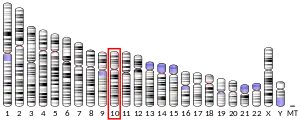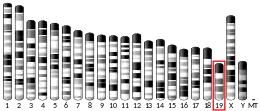HPSE2
Heparanase-2 is an enzyme that in humans is encoded by the HPSE2 gene.[5][6]
It may be associated with urofacial syndrome.[7]
References
- GRCh38: Ensembl release 89: ENSG00000172987 - Ensembl, May 2017
- GRCm38: Ensembl release 89: ENSMUSG00000074852 - Ensembl, May 2017
- "Human PubMed Reference:". National Center for Biotechnology Information, U.S. National Library of Medicine.
- "Mouse PubMed Reference:". National Center for Biotechnology Information, U.S. National Library of Medicine.
- McKenzie E, Tyson K, Stamps A, Smith P, Turner P, Barry R, Hircock M, Patel S, Barry E, Stubberfield C, Terrett J, Page M (Oct 2000). "Cloning and expression profiling of Hpa2, a novel mammalian heparanase family member". Biochem Biophys Res Commun. 276 (3): 1170–7. doi:10.1006/bbrc.2000.3586. PMID 11027606.
- "Entrez Gene: HPSE2 heparanase 2".
- Daly SB, Urquhart JE, Hilton E, et al. (June 2010). "Mutations in HPSE2 Cause Urofacial Syndrome". Am J Hum Genet. 86 (6): 963–969. doi:10.1016/j.ajhg.2010.05.006. PMC 3032078. PMID 20560210.
Further reading
- D'Souza SS, Fazleabas AT, Banerjee P, et al. (2008). "Decidual heparanase activity is increased during pregnancy in the baboon (Papio anubis) and in in vitro decidualization of human stromal cells". Biol. Reprod. 78 (2): 316–23. doi:10.1095/biolreprod.107.063891. PMID 17989358. S2CID 32383560.
- Bar-Sela G, Kaplan-Cohen V, Ilan N, et al. (2006). "Heparanase expression in nasopharyngeal carcinoma inversely correlates with patient survival". Histopathology. 49 (2): 188–93. doi:10.1111/j.1365-2559.2006.02469.x. PMID 16879396. S2CID 46173868.
- Beckhove P, Helmke BM, Ziouta Y, et al. (2005). "Heparanase expression at the invasion front of human head and neck cancers and correlation with poor prognosis". Clin. Cancer Res. 11 (8): 2899–906. doi:10.1158/1078-0432.CCR-04-0664. PMID 15837740.
- Ogishima T, Shiina H, Breault JE, et al. (2005). "Increased heparanase expression is caused by promoter hypomethylation and up-regulation of transcriptional factor early growth response-1 in human prostate cancer". Clin. Cancer Res. 11 (3): 1028–36. PMID 15709168.
- Wang Z, Xu H, Jiang L, et al. (2005). "Positive association of heparanase expression with tumor invasion and lymphatic metastasis in gastric carcinoma". Mod. Pathol. 18 (2): 205–11. doi:10.1038/modpathol.3800282. PMID 15475937.
- Deloukas P, Earthrowl ME, Grafham DV, et al. (2004). "The DNA sequence and comparative analysis of human chromosome 10". Nature. 429 (6990): 375–81. doi:10.1038/nature02462. PMID 15164054.
- Ota T, Suzuki Y, Nishikawa T, et al. (2004). "Complete sequencing and characterization of 21,243 full-length human cDNAs". Nat. Genet. 36 (1): 40–5. doi:10.1038/ng1285. PMID 14702039.
- Strausberg RL, Feingold EA, Grouse LH, et al. (2003). "Generation and initial analysis of more than 15,000 full-length human and mouse cDNA sequences". Proc. Natl. Acad. Sci. U.S.A. 99 (26): 16899–903. doi:10.1073/pnas.242603899. PMC 139241. PMID 12477932.
This article is issued from Wikipedia. The text is licensed under Creative Commons - Attribution - Sharealike. Additional terms may apply for the media files.




